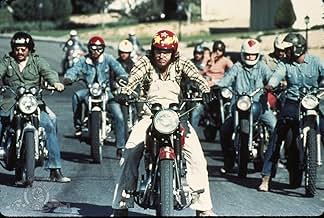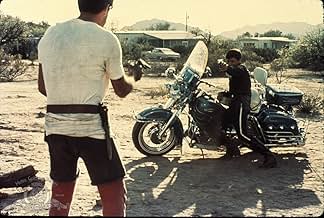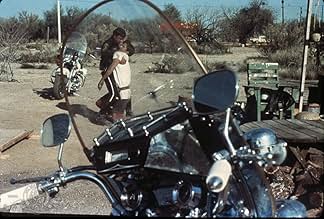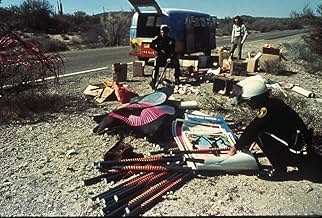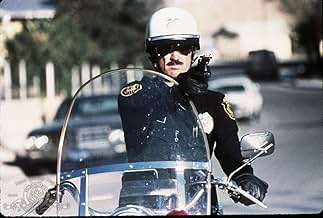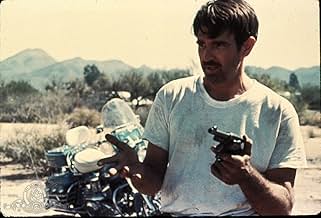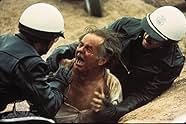CALIFICACIÓN DE IMDb
7.0/10
6.9 k
TU CALIFICACIÓN
El ambicioso pero diminuto policía en motocicleta John Wintergreen patrulla las carreteras de Arizona, anhelando ser ascendido a la división de homicidios.El ambicioso pero diminuto policía en motocicleta John Wintergreen patrulla las carreteras de Arizona, anhelando ser ascendido a la división de homicidios.El ambicioso pero diminuto policía en motocicleta John Wintergreen patrulla las carreteras de Arizona, anhelando ser ascendido a la división de homicidios.
- Dirección
- Guionistas
- Elenco
- Premios
- 3 nominaciones en total
Billy Green Bush
- Zipper
- (as Billy 'Green' Bush)
Elisha Cook Jr.
- Willie
- (as Elisha Cook)
Hawk Wolinski
- VW Bus Driver
- (as David J. Wolinski)
Melissa Greene
- Zemko's Girlfriend
- (as Melissa Green)
Opiniones destacadas
Much chat about this film, especially now since it's 'finally' out on DVD in wide screen format.
This is the best film of a specialized genre from the late 60's through early 1970's exploring the counter-culture revolution and the "Establishment".
Unlike Easy Rider, A Clockwork Orange and Billy Jack, EGIB hits the nail on the head. There is evil everywhere, and good intentions don't always result in good outcomes.
Beautiful directorial debut by Guercio, awesome cinematography by Conrad Hall.
In essence, one of the best films from 1973.
This is the best film of a specialized genre from the late 60's through early 1970's exploring the counter-culture revolution and the "Establishment".
Unlike Easy Rider, A Clockwork Orange and Billy Jack, EGIB hits the nail on the head. There is evil everywhere, and good intentions don't always result in good outcomes.
Beautiful directorial debut by Guercio, awesome cinematography by Conrad Hall.
In essence, one of the best films from 1973.
An incredible piece of film making, this beautifully shot movie really is about as poetic as it's possible for cinema to be and still have a coherent, gripping narrative. It feels like a western with its dramatic monument valley backdrop and masculine themes, but plays more like a European movie, with it's dark characterisations and existential mood . The soundtrack is fantastic and the feeling the movie imparts is unique. I always recommend this film to people because so few have ever seen it. I think it's a tragedy that James Guercio didn't make more movies because this was his first (and only) film and it's up there with the best of Peckinpah/Leone/Boorman/Seigal (whose work is similar). I'll never forget this film and the ending will live with me forever. If you like movies you need to see this film, This is real Cinema.
EGinB should be seen as an anthem to early 70's America, and the ringing messages of all road movies at the time.The film is unique as a tour de force from a director who knew precisely what he was doing.From the opening scene, with it's brilliant use of close-ups, to the final incredible draw-back, EGinB relentlessly drives home the message of post-Vietnam America, with themes of honesty,realization,ruthlessness and duty.As in other Road Movies, the Road is the conduit along which America travels for hope and redemption.The implication is that it is only in the expanse and purity of the Big Country that these ideals can be attained.
Blake seizes his opportunity to wrest his character, Wintergreen, out of the Vietnam War and into a troubled American Society; not without a little resentment along the way. His remark to the truckdriver he books, displays his feelings; " I'll give you,what they gave me (in Vietnam)...nothing". His ideals of right and honesty give way eventually to acceptance of the system, with all it's failings.
The photography is beautiful and skillful, lending a curious winsome nostalgia to the Great American Outback.Wintergreen's gleaming bike,( the Electra Glide of the title), deserves a credit of it's own. EGinB has an ending that audiences have argued about for 30 years. I think it is an original devize by the director, that emphasises the plight of nations and individuals, who trade honesty and integrity for mundanity and compromise.Additionally, what you are really watching during the long 7 1/2 minutes drawback, is a pictorial unfolding of the American flag.This echos the ' God bless America ' lyrics of the Big Elk soundtrack.Watch it, and listen to the music of Big Elk as it unfolds.It somehow encapsulates the film and it's themes, and is mesmeric for that. See it, but realize what you are watching; it's worth the research; and you'll never see a Volkswagan Camper in the same light again!
Blake seizes his opportunity to wrest his character, Wintergreen, out of the Vietnam War and into a troubled American Society; not without a little resentment along the way. His remark to the truckdriver he books, displays his feelings; " I'll give you,what they gave me (in Vietnam)...nothing". His ideals of right and honesty give way eventually to acceptance of the system, with all it's failings.
The photography is beautiful and skillful, lending a curious winsome nostalgia to the Great American Outback.Wintergreen's gleaming bike,( the Electra Glide of the title), deserves a credit of it's own. EGinB has an ending that audiences have argued about for 30 years. I think it is an original devize by the director, that emphasises the plight of nations and individuals, who trade honesty and integrity for mundanity and compromise.Additionally, what you are really watching during the long 7 1/2 minutes drawback, is a pictorial unfolding of the American flag.This echos the ' God bless America ' lyrics of the Big Elk soundtrack.Watch it, and listen to the music of Big Elk as it unfolds.It somehow encapsulates the film and it's themes, and is mesmeric for that. See it, but realize what you are watching; it's worth the research; and you'll never see a Volkswagan Camper in the same light again!
American music producer James William Guercio's one-off dalliance with filmmaking, ELECTRA GLIDE IN BLUE is made when he is only 28-year-old. It stars Robert Blake as a motorcycle cop Johnny Wintergreen who patrols rural Arizona highways and aspires to be a homicidal officer.
The movie opens with a promising panache hardly betrays that Guercio is a greenhorn, conjecturing through its voyeuristic close-ups, audience would soon realize a face-unshown man prepares to kill himself, yet, Guercio's camera also cunningly suggests that he is cooking beef streaks at the same time. Then, boom! He blows himself dead through a shotgun, which unusually aims to his chest rather than the usual easy target, the head, it compellingly sets a paradoxical situation that one immediately knows there is something fishy about the whole act.
Also, before the title card, Guercio takes a tongue-in-cheek tack to introduce our unlikely hero, big Johnny, the camera lurks and swirls in the apartment where Johnny expertly gratifies Jolene (Riley) in bed, before revealing that Johnny is small in stature. When a man's masculinity is stunted by his appearances, it gives audience an idea why he is so eager to achieve something, to compensate the ingrained inferiority complex is a shoo-in. So the apparent-suicidal case becomes his stepping stone to be recruited by detective Harve Poole (Ryan) for his astute observation that it is indeed a murder underneath the hatched facade.
But the ensuing police procedural dampens Johnny's driving enthusiasm, especially after witnessing Harve hectors physically abuses and a group of hippies to milk information about their prime suspect, a drug dealer Bob Zembo (a cameo of Peter Cetera, one of the four CHICAGO members who take on acting roles here apart from their contribution to the picture's soundtrack), and the final straw is an awkward confrontation between him, Harve and Jolene, the latter turns out to be Harve's lover, and spitefully lambastes Harve's incompetence to make her contented and laments her ill-fated destiny, working in a barrelhouse after a dashed Hollywood dream, Johnny and Harv fall out afterwards.
Unambiguously Guercio conducts a half-hearted approach to solve the murder mystery, after trifling with a biker-chasing set piece to keep the action moving, the movie falls back on Johnny's "inner voice" for an expedient epiphany to realize who is the murderer at the end of a MADURA concert, with reasons unexplained, but that is not enough, ultimately there would be another revelation later, to further muddle the water and leave the opening scene ever so ambivalent when one retraces back, before reaching its chilling coda, completely hits viewers like a cold shower, willful but symbolic, overall, it is a loner's world against the canvas of a vast Arizona landscape, everyone in the story is either indolent, disillusioned or corrupt, only the hippies' community stands in as a getaway from the unpleasant reality, but their guarded world is defiant towards the mainstream values, Johnny represents a tragic hero who is doomed because of what he represents, an authority figure, cannot be saved by his amiable personality and all-too-well intentions.
Performance-wise, everyone on board is on a par with excellence, Elisha Cook Jr. is heart-rending to watch in his committed lunacy, Mitchell Ryan expertly imbues a certain degree of passing diffidence in his bombast mannerism and Billy Green Bush is so organic as Johnny's shade- hogging partner and nails his big scene with a flourish, so is Jeannine Riley, manages to steal some limelight even with a role riddled with platitudes. And our leading man Robert Blake, ever so self- reliant as a pipsqueak trying rather hard to chase his dream, only to get short-changed by a cynical world.
ELECTRA GLIDE IN BLUE, also bolstered by a symphonic soundtrack produced by Guercio himself and its striking wide-screen landscape sensation shot by DP Conrad L. Hall, is an astonishing debut feature, if it intends to be more of a zeitgeist-capturer than a gripping detective story, then I must give my whole-hearted congratulations to the crew, mission grandly accomplished!
The movie opens with a promising panache hardly betrays that Guercio is a greenhorn, conjecturing through its voyeuristic close-ups, audience would soon realize a face-unshown man prepares to kill himself, yet, Guercio's camera also cunningly suggests that he is cooking beef streaks at the same time. Then, boom! He blows himself dead through a shotgun, which unusually aims to his chest rather than the usual easy target, the head, it compellingly sets a paradoxical situation that one immediately knows there is something fishy about the whole act.
Also, before the title card, Guercio takes a tongue-in-cheek tack to introduce our unlikely hero, big Johnny, the camera lurks and swirls in the apartment where Johnny expertly gratifies Jolene (Riley) in bed, before revealing that Johnny is small in stature. When a man's masculinity is stunted by his appearances, it gives audience an idea why he is so eager to achieve something, to compensate the ingrained inferiority complex is a shoo-in. So the apparent-suicidal case becomes his stepping stone to be recruited by detective Harve Poole (Ryan) for his astute observation that it is indeed a murder underneath the hatched facade.
But the ensuing police procedural dampens Johnny's driving enthusiasm, especially after witnessing Harve hectors physically abuses and a group of hippies to milk information about their prime suspect, a drug dealer Bob Zembo (a cameo of Peter Cetera, one of the four CHICAGO members who take on acting roles here apart from their contribution to the picture's soundtrack), and the final straw is an awkward confrontation between him, Harve and Jolene, the latter turns out to be Harve's lover, and spitefully lambastes Harve's incompetence to make her contented and laments her ill-fated destiny, working in a barrelhouse after a dashed Hollywood dream, Johnny and Harv fall out afterwards.
Unambiguously Guercio conducts a half-hearted approach to solve the murder mystery, after trifling with a biker-chasing set piece to keep the action moving, the movie falls back on Johnny's "inner voice" for an expedient epiphany to realize who is the murderer at the end of a MADURA concert, with reasons unexplained, but that is not enough, ultimately there would be another revelation later, to further muddle the water and leave the opening scene ever so ambivalent when one retraces back, before reaching its chilling coda, completely hits viewers like a cold shower, willful but symbolic, overall, it is a loner's world against the canvas of a vast Arizona landscape, everyone in the story is either indolent, disillusioned or corrupt, only the hippies' community stands in as a getaway from the unpleasant reality, but their guarded world is defiant towards the mainstream values, Johnny represents a tragic hero who is doomed because of what he represents, an authority figure, cannot be saved by his amiable personality and all-too-well intentions.
Performance-wise, everyone on board is on a par with excellence, Elisha Cook Jr. is heart-rending to watch in his committed lunacy, Mitchell Ryan expertly imbues a certain degree of passing diffidence in his bombast mannerism and Billy Green Bush is so organic as Johnny's shade- hogging partner and nails his big scene with a flourish, so is Jeannine Riley, manages to steal some limelight even with a role riddled with platitudes. And our leading man Robert Blake, ever so self- reliant as a pipsqueak trying rather hard to chase his dream, only to get short-changed by a cynical world.
ELECTRA GLIDE IN BLUE, also bolstered by a symphonic soundtrack produced by Guercio himself and its striking wide-screen landscape sensation shot by DP Conrad L. Hall, is an astonishing debut feature, if it intends to be more of a zeitgeist-capturer than a gripping detective story, then I must give my whole-hearted congratulations to the crew, mission grandly accomplished!
Before he found himself on the wrong side of a murder investigation, Blake was noted for playing an unconventional cop on the TV show "Baretta" (and also the flip side as a brutal killer in the film "In Cold Blood".) Here he is a square peg trying to fit into a round hole as a California Highway Patrolman with dreams of more. At 5'4", he is a full head shorter than the shortest of his fellow motorcycle-riding fellow officers. Though his cohort Bush balances his days between sitting on his bike reading comic books and listening to the radio with pulling over anyone even remotely suspicious, Blake yearns to be a better cop than that and, ultimately, a detective. When (after a thoroughly gripping opening sequence) a man is found shot to death, Blake seizes the opportunity to piece the situation together and becomes the driver and right hand man to hotshot detective Ryan. As the pair attempts to solve the mystery of the man's death, their faults, attributes and insecurities are laid bare (notably in an extended scene with Riley, a barmaid who has known both men for a long time.) Finally, the truth of the death comes to light, but only after significant turmoil, carnage and some surprises. Blake is terrific in the lead. He perfectly captures the awkwardness mixed with ambition of his character. He has many memorable scenes, more than a few of which that poke fun at his size (though he was in great physical shape at the time.) Bush lends strong support as his rather amoral buddy. Ryan is splendidly authoritarian and paints a memorable portrait of a man who is a big shot (especially in his own mind) every time and everywhere except when it counts. He is perfect in the role. Cook has a very showy and effective role as a mentally challenged old man who discovers the body. Riley is effective in her sleazy, but sympathetic role, but her big scene does seem out of place somehow and shifts the focus of the movie more than it probably ought to. Dano, a strong character actor in countless TV and film projects, does an excellent job as a jaded coroner (a far cry from "Quincy M.D.", he not only eschews a surgical mask, but smokes a cigarette during the autopsy!) The film is gorgeously photographed and extremely creatively directed. It had to be way ahead of its time in terms of camera-work. The texture and atmosphere of the scenes is beyond most of what is cranked out today. It's also loaded with quirkiness and irony (some might say overloaded.) In any case, it's a unique viewing experience with many rewards for the patient and incisive viewer. There's also a motorcycle chase that rivals any of the best from this period. Like so many films, the only way it can be fully appreciated is in the widescreen format. The glimpses of Monument Valley are welcome and add much to the visual appeal of the film. The film isn't completely flawless, but it is highly memorable. The title refers to the make and color of a motorcycle.
¿Sabías que…?
- TriviaFirst-time director James William Guercio wanted Conrad L. Hall to photograph this film, but Hall's salary was more than was budgeted for a cinematographer. Guercio reduced his own salary to $1.00 so he could secure Hall as the cinematographer.
- ErroresIn the final driving scenes, the van and the bike, supposedly driving along a long straight road, drive by the same distant butte at least three times.
- Citas
Harve Poole: Incompetence is the worst form of corruption.
- Versiones alternativasJohn Wintergreen is called John Winterberg in the German version.
- ConexionesEdited into The Our Gang Story (1994)
Selecciones populares
Inicia sesión para calificar y agrega a la lista de videos para obtener recomendaciones personalizadas
- How long is Electra Glide in Blue?Con tecnología de Alexa
Detalles
Taquilla
- Total en EE. UU. y Canadá
- USD 1,600,000
- Tiempo de ejecución1 hora 54 minutos
- Color
- Mezcla de sonido
- Relación de aspecto
- 2.39 : 1
Contribuir a esta página
Sugiere una edición o agrega el contenido que falta


